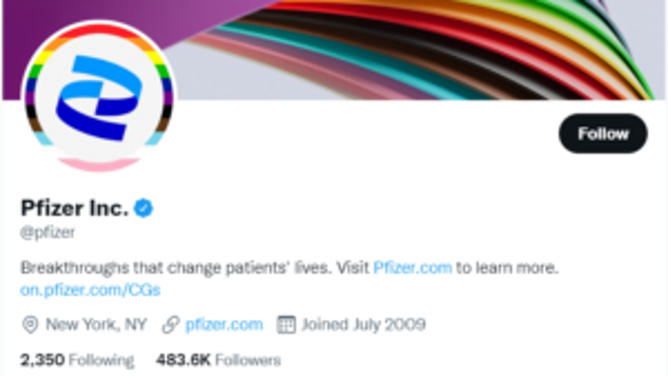Pride Month and the Fraudulence of Corporate-Backed Social Justice Branding
Social media is more colorful this week. Like a rainbow, to be more specific.
As per tradition, the official accounts of prominent US brands have turned their avatars into rainbow flags for June, a month dedicated to gay pride.
Tuesday, Elon Musk posted a meme with a preview of what the month entails:
Musk may have undersold how important LGBT pride is to branding in America this year. Google highlighted June 1 on the calendar as if its significance is on par with Memorial Day and the beginning of summer.
Seeing the pride flag plastered across the web could lead one to believe that corporations are unified in a grand celebration. Except, these companies are not celebrating anything. They are not empowering the LGBT community either. Instead, the Googles and Facebooks are weaponizing the occasion to empower themselves through status gain.
Rainbow-inspired profile images are neither noble nor courageous. These pandering avatars are signs of peak hypocrisy.
The same corporations that share the slogan "be bold, be proud, be gay" in the US have succumbed to governments that suppress and outlaw homosexuality.
Wednesday, the corrupt pharmaceutical company called Pfizer Inc. issued a mandate for its social media team to embrace the rainbow flag for the month. But in the command, Pfizer specified to make clear that it supports LGBT equality only in select countries.
Here's Pfizer's social page in the US compared to in Saudi Arabia, a country in which same-sex sexual activity is illegal:

(Above: Pfizer's Twitter page in the United States.)

(Above: Pfizer's Twitter page in Saudi Arabia.)
On the same day, teams in the NBA tweeted out quiz questions to better inform followers about gay history. The NBA, however, left out of its history lesson that it will make its own history this year when it stages games in the United Arab Emirates. In the UAE, the law states that the government may punish homosexuality by death.
But because the league has a rainbow flag on its timeline, the NBA believes all is well.
The Walt Disney Co, a leader in mischaracterizing a Florida law as a ban on the word “gay,” just recently cut a movie scene that alluded to homosexuality in the film Turning Red. Disney acts at the behest of the Chinese government. When China says don't say gay, Disney doesn’t dare say gay.
So while US-based CEOs tell American consumers that they are LGBTQIA+ advocates, they are leading other countries to believe the opposite. These corporations will promote whichever belief is financially advantageous at a given time, no matter the hypocrisy or the inconsistency.
And in the US, the consensus strategy is to propagate whichever trend is circulating inside the halls of wokeness. See, supporting marginalized groups is in vogue in America. In other countries, not so much.
Human rights are a ploy to the industries that market around them.
Fear is the only explanation for this level of fraudulence. Just as social media users instinctively support the latest progressive trend through mass formation psychosis, executive marks do out of fear.
Front-facing business figures remain gravely afraid of the journalists and advocates who form the outrage mobs. Sitting suits have seen too many careers of their counterparts crater amid streams of outrage that emanate on Twitter. And they fear they are next and thus will champion any social movement to prevent that.
Last fall, I wrote, "Most Americans are not concerned with gender pronouns, though many think placing them in their bios protects them. It's hard to call for someone's job with he/she/him/her attached to their timeline. Individuals also don't wake up worried there are too many white people on a single program. Still, posting the count on Facebook signals that the user is anti-racist, whatever that means."
Therefore, in conjunction with PR firms, corporations have used social media pages as templates to promote which side of the cultural divide they are on.
Each social media campaign --- from #BLM to #MaskUp to vaxxed/boosted -- has been about subjects proving to critics that they are not racist, sexist, homophobic or a MAGA conservative, four labels that often torpedo careers: (Please, say all four words in a spooky tone.)
It is by no coincidence that the increased usage of rainbow flags this year follows a period in which trans athletes, sex changes for children and gender fluidity became prominent political topics. In sum, participating in Pride Month is more convenient than in past years.
"If we post the rainbow, they won't come for us, right?" the thinking goes.
Fortune 500 stooges believe that sharing a colorful flag will prove useful when some New York Times writer -- and they eventually come for everyone -- uncovers a joke they made a decade ago or accuses their company of not having enough LGBT employees in prominent roles.
A rainbow profile photo isn't a celebration of the gay community. Rather, it's an opportunity for companies partnering with staunch anti-gay governments to grant themselves a reputation in the US that they do not deserve.
Twitter feeds full of rainbows do not show a society that is united but one that is fearful and concerned only about perception. Participants of social movements have always been more focused on their own image than justice, anyway.